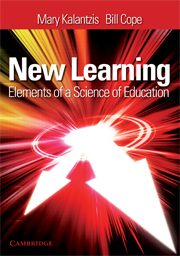Book contents
- Frontmatter
- Contents
- Preface
- Acknowledgements
- Part A Introduction – Changing Education
- Part B Contexts – Changing Conditions for Learning
- Part C Responses – Ways of Learning and Teaching
- 6 The nature of learning
- 7 Knowledge and learning
- 8 Pedagogy and curriculum
- 9 Learning communities at work
- Conclusion: futures of education
- References
- Index
6 - The nature of learning
from Part C - Responses – Ways of Learning and Teaching
- Frontmatter
- Contents
- Preface
- Acknowledgements
- Part A Introduction – Changing Education
- Part B Contexts – Changing Conditions for Learning
- Part C Responses – Ways of Learning and Teaching
- 6 The nature of learning
- 7 Knowledge and learning
- 8 Pedagogy and curriculum
- 9 Learning communities at work
- Conclusion: futures of education
- References
- Index
Summary
Overview
In this chapter we investigate the nature of learning and explore alternative understandings of how learning occurs.
Behaviourism is one of the earliest schools of thought in the modern discipline of psychology. Behaviourists argue that we cannot know much about the human mind and consciousness – these subjects are too difficult and, given the illusive subject matter, too liable to bias from alternative perspectives and interpretations created in the mind itself. All we can reliably know is what we can see by observing behaviours. By studying animals and humans, behaviourists conclude that the most basic and universal learning mechanism is stimulus–response–reinforcement.
A number of newer approaches to learning can be grouped under the category brain developmentalism. These include developmental psychology, which describes stages of cognitive readiness that indicate levels of brain development; the study of language to interpret the general shape of the ‘language instinct’ in all humans; and neuroscientific studies of the working brain.
Recent social–cognitivist approaches to learning benefit from the growing body of research into the workings of the brain, but add a social and cultural dimension. The brain provides an extraordinary range of affordances, and these translate into very different potentialities depending on social and cultural context. Intelligence is not just in the brain; its sources are social.
Information
- Type
- Chapter
- Information
- New LearningElements of a Science of Education, pp. 143 - 157Publisher: Cambridge University PressPrint publication year: 2008
